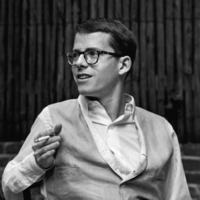The Broken Home
Crossing the street,
I saw the parents and the child
At their window, gleaming like fruit
With evening’s mild gold leaf.
In a room on the floor below,
Sunless, cooler—a brimming
Saucer of wax, marbly and dim—
I have lit what’s left of my life.
I have thrown out yesterday’s milk
And opened a book of maxims.
The flame quickens. The word stirs.
Tell me, tongue of fire,
That you and I are as real
At least as the people upstairs.
My father, who had flown in World War I,
Might have continued to invest his life
In cloud banks well above Wall Street and wife.
But the race was run below, and the point was to win.
Too late now, I make out in his blue gaze
(Through the smoked glass of being thirty-six)
The soul eclipsed by twin black pupils, sex
And business; time was money in those days.
Each thirteenth year he married. When he died
There were already several chilled wives
In sable orbit—rings, cars, permanent waves.
We’d felt him warming up for a green bride.
He could afford it. He was “in his prime”
At three score ten. But money was not time.
When my parents were younger this was a popular act:
A veiled woman would leap from an electric, wine-dark car
To the steps of no matter what—the Senate or the Ritz Bar—
And bodily, at newsreel speed, attack
No matter whom—Al Smith or José María Sert
Or Clemenceau—veins standing out on her throat
As she yelled War mongerer! Pig! Give us the vote!,
And would have to be hauled away in her hobble skirt.
What had the man done? Oh, made history.
Her business (he had implied) was giving birth,
Tending the house, mending the socks.
Always that same old story—
Father Time and Mother Earth,
A marriage on the rocks.
One afternoon, red, satyr-thighed
Michael, the Irish setter, head
Passionately lowered, led
The child I was to a shut door. Inside,
Blinds beat sun from the bed.
The green-gold room throbbed like a bruise.
Under a sheet, clad in taboos
Lay whom we sought, her hair undone, outspread,
And of a blackness found, if ever now, in old
Engravings where the acid bit.
I must have needed to touch it
Or the whiteness—was she dead?
Her eyes flew open, startled strange and cold.
The dog slumped to the floor. She reached for me. I fled.
Tonight they have stepped out onto the gravel.
The party is over. It’s the fall
Of 1931. They love each other still.
She: Charlie, I can’t stand the pace.
He: Come on, honey—why, you’ll bury us all!
A lead soldier guards my windowsill:
Khaki rifle, uniform, and face.
Something in me grows heavy, silvery, pliable.
How intensely people used to feel!
Like metal poured at the close of a proletarian novel,
Refined and glowing from the crucible,
I see those two hearts, I’m afraid,
Still. Cool here in the graveyard of good and evil,
They are even so to be honored and obeyed.
. . . Obeyed, at least, inversely. Thus
I rarely buy a newspaper, or vote.
To do so, I have learned, is to invite
The tread of a stone guest within my house.
Shooting this rusted bolt, though, against him,
I trust I am no less time’s child than some
Who on the heath impersonate Poor Tom
Or on the barricades risk life and limb.
Nor do I try to keep a garden, only
An avocado in a glass of water—
Roots pallid, gemmed with air. And later,
When the small gilt leaves have grown
Fleshy and green, I let them die, yes, yes,
And start another. I am earth’s no less.
A child, a red dog roam the corridors,
Still, of the broken home. No sound. The brilliant
Rag runners halt before wide-open doors.
My old room! Its wallpaper—cream, medallioned
With pink and brown—brings back the first nightmares,
Long summer colds, and Emma, sepia-faced,
Perspiring over broth carried upstairs
Aswim with golden fats I could not taste.
The real house became a boarding school.
Under the ballroom ceiling’s allegory
Someone at last may actually be allowed
To learn something; or, from my window, cool
With the unstiflement of the entire story,
Watch a red setter stretch and sink in cloud.

